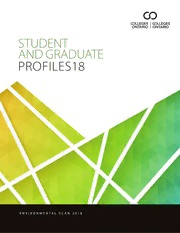
ERIC ED603108: Student and Graduate Profiles 18. Environmental Scan 2018 PDF
Preview ERIC ED603108: Student and Graduate Profiles 18. Environmental Scan 2018
STUDENT AND GRADUATE PROFILES18 E N V I R O N M E N TA L S C A N 2 0 1 8 1. HIGHLIGHTS 3 2. COLLEGE ACTIVITY 3. NUMBERS OF ONTARIO COLLEGE APPLICANTS, STUDENTS AND GRADUATES 5 Applicants 5 Students 7 Collaborative nursing students 9 International students 10 Second Career students 11 Graduates 13 4. LEARNER DEMOGRAPHICS AND CHARACTERISTICS 15 Level of education 17 Household income 18 Population of applicant communities 19 Aboriginal status 20 Students with disabilities 21 Main goals 22 5. APPRENTICES 24 6. CONTINUING EDUCATION STUDENTS 27 7. GRADUATES 29 8. PERCEPTIONS 36 Students 36 Graduates 37 9. KEY PERFORMANCE INDICATORS 39 10. NOTES ON DATA SOURCES 42 2018 ENVIRONMENTAL SCAN • COLLEGES ONTARIO Student and Graduate Profiles 3 • Each year, more than 500,000 students and clients are served by Ontario’s colleges of applied arts and technology (CAATs). Of this group, more than 200,000 are full-‐time students. • There were 191,359 distinct applicants for the 2016-‐17 academic year. • Fifty-‐nine per cent of new fall 2017 entrants to Ontario post-‐secondary institutions enrolled in a college. • More than 25 per cent of college applicants reported household incomes of less than $30,000, and almost 50 per cent had incomes of less than $60,000. • Total funded full-‐time equivalent (FTE) post-‐secondary enrolment in the colleges was 218,701 (including funded full-‐time, part-‐time and tuition-‐short programs). • More than 55,000 international students enrolled in Ontario colleges in fall 2017. • Colleges delivered 85 per cent of apprenticeship in-‐school training in 2016-‐17. • Last year, more than 99,000 people graduated from college post-‐secondary programs. • Eighty-‐three per cent of 2015-‐16 graduates in the labour force were working six months after graduation. 2018 ENVIRONMENTAL SCAN • COLLEGES ONTARIO Student and Graduate Profiles 4 2. COLLEGE ACTIVITY Figure 1. Relative distribution of learners/clients served by Ontario’s colleges Sources: Ontario Ministry of Advanced Education and Skills Development; OCAS; College Sector Committee for Adult Upgrading. • Serving more than 500,000 people, learners at Ontario colleges comprise a diverse population. In addition to traditional post-‐secondary education (PSE), colleges offer many other types of programs and courses, including apprenticeship training, continuing education courses, collaborative programs with universities, and literacy and basic skills programs. 2018 ENVIRONMENTAL SCAN • COLLEGES ONTARIO Student and Graduate Profiles 5 3. NUMBERS OF ONTARIO COLLEGE APPLICANTS, STUDENTS AND GRADUATES APPLICANTS Table 1. Per cent of CAAT applicants* direct from secondary school vs. non-‐direct by year Direct Non-‐direct Year Total Number % of total Number % of total 38.9% 2008-‐09 68,056 106,776 61.1% 174,832 36.5% 2009-‐10 70,970 123,597 63.5% 194,567 36.6% 2010-‐11 71,480 123,868 63.4% 195,348 34.7% 2011-‐12 64,124 120,916 65.3% 185,040 34.5% 2012-‐13 67,714 128,656 65.5% 196,370 34.6% 2013-‐14 69,256 130,742 65.4% 199,998 2014-‐15 68,384 34.7% 128,639 65.3% 197,023 2015-‐16 62,488 32.1% 132,440 67.9% 194,928 2016-‐17** 54,450 28.5% 136,909 71.5% 191,359 2017-‐18** 53,685 27.0% 144,840 73.0% 198,525 *Distinct applicants across fall/winter/spring. ** Preliminary numbers; the application cycle is not complete. To date, May 2018. Direct: Applicants applying directly from high school (for OCAS applicant data, this category includes school board-‐run adult day schools). Non-‐direct: Applicants not applying directly after high school. Source: OCAS. 2018 ENVIRONMENTAL SCAN • COLLEGES ONTARIO Student and Graduate Profiles 6 Figure 2. New fall 2017 Ontario post-‐secondary entrants by sector Note: University and college data include first-‐year full-‐time domestic head counts for fall 2017. Significant numbers of students also enrol in colleges during the winter and spring intake periods, not shown in the above figure. Full-‐time CAAT apprentices are included with the college data. Sources: Ontario Ministry of Advanced Education and Skills Development; OCAS. • A majority of new fall 2017 entrants to post-‐secondary education in Ontario enrolled in a college. 2018 ENVIRONMENTAL SCAN • COLLEGES ONTARIO Student and Graduate Profiles 7 STUDENTS Post-‐secondary-‐funded enrolment Figure 3. Funded college enrolments as FTEs* from 2007-‐08 to 2016-‐17 * FTE = full-‐time equivalent; FT = full time; PT = part time; TS = tuition short (programs typically less than 52 weeks in duration). Note that funded students do not comprise the total college population. Source: Ontario Ministry of Advanced Education and Skills Development. 2018 ENVIRONMENTAL SCAN • COLLEGES ONTARIO Student and Graduate Profiles 8 Table 2. Total funded college enrolment as FTE by college, 2016-‐17 College 2016-‐17 FTE Algonquin 19,209 Boréal 1,471 Cambrian 3,568 Canadore 2,507 Centennial 10,753 Conestoga 10,857 Confederation 3,015 Durham 11,110 Fanshawe 14,093 Fleming 6,340 George Brown 21,300 Georgian 9,711 Humber 22,056 La Cité 4,317 Lambton 2,490 Loyalist 3,089 Mohawk 12,364 Niagara 7,915 Northern 996 Sault 2,046 Seneca 20,024 Sheridan 16,121 St. Clair 8,109 St. Lawrence 5,242 Total 218,701 Note that funded students do not comprise the total college population. Source: Ontario Ministry of Advanced Education and Skills Development. 2018 ENVIRONMENTAL SCAN • COLLEGES ONTARIO Student and Graduate Profiles 9 Collaborative nursing students Figure 4. Ontario college-‐university collaborative nursing programs: total full-‐time fall enrolment*by year * Includes full-‐time students reported by colleges or their university partners. Source: Ontario Ministry of Advanced Education and Skills Development. • Collaborative nursing programs are offered through college-‐university partnerships. Although individual models vary, nursing students typically complete courses at both the college and university campuses. Students in these nursing programs are counted separately from the post-‐secondary-‐ funded FTEs and enrolment numbers are reported either through the college or the university. 2018 ENVIRONMENTAL SCAN • COLLEGES ONTARIO Student and Graduate Profiles 10 International students FIgure 5. International student enrolment by program category Source: OCAS, November enrolment count. • More than 55,000 international students enrolled at colleges in 2017-‐18. 2018 ENVIRONMENTAL SCAN • COLLEGES ONTARIO Student and Graduate Profiles 11
